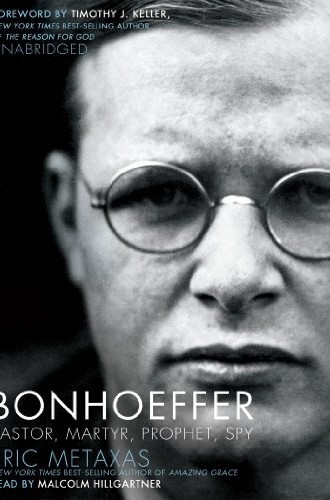Hijacking Bonhoeffer
You have to read Eric Metaxas with bifocals. With the upper lens you read the Metaxas of the book, an engaging narrative by an experienced writer who presents Bonhoeffer as a Christian hero led by God to struggle against an evil regime and against his wayward church. With the lower lens you read the Metaxas revealed in numerous web interviews in which he gives his account of Bonhoeffer's "staggering" significance today.
Metaxas first read Bonhoeffer's The Cost of Discipleship at the time of his evangelical conversion some 20 years ago. Formerly a staff writer for Chuck Colson's BreakPoint, he appears frequently as a cultural commentator on Fox News and CNN. He founded and hosts Socrates in the City, a monthly event in New York featuring prominent speakers on "life, God, and other small topics." He presumably treats such topics in his trilogy of popular apologetics, the first being Everything You Always Wanted to Know About God (But Were Afraid to Ask). In 2007 he published Amazing Grace: William Wilberforce and the Heroic Campaign to End Slavery, which made the New York Times best-seller list and was the companion book to the film Amazing Grace.
Read our latest issue or browse back issues.
Readers coming to Bonhoeffer for the first time will likely be carried along by Metaxas's engaging narrative and admiration for his subject. A talented writer, he depends heavily on Eberhard Bethge's biography— 40 years old but still an unsurpassed source. His new material comes especially from the Dietrich Bonhoeffer Works English edition, which contains eight volumes of Bonhoeffer's letters, sermons and papers. Metaxas quotes copiously from the five volumes that have only recently been translated. Also built into the narrative are letters between Bonhoeffer and his fiancée, Maria von Wedemeyer, published in 1994 as Love Letters from Cell 92. Other sources include various memoirs written by Bonhoeffer's sister Sabine and by acquaintances such as Paul Lehmann, Reinhold Niebuhr and George Bell. Martin Doblmeier, maker of the film Bonhoeffer, calls the book "a masterpiece that reads like a great novel" and its author "the preeminent biographer of Christianity's most courageous figures."
I will not linger over the numerous factual errors, including problems with the German words sprinkled throughout the text (even the notorious names Buchenwald and Dachau are misspelled). I will not fret about the problems infecting the copious endnotes, especially the missing, incomplete and garbled sources. I will not dwell on the fact that a critical assessment of sources is absent. (Metaxas repeats the pious and probably self-serving statement of the Flossenbürg camp doctor about Bonhoeffer's death and the canard about Bonhoeffer's radio speech on the Führer being cut off as if he were a marked man from the beginning of Hitler's rule, when in fact he just went over the time limit.) One of the signs that the book was rushed through the press to appear on the 65th anniversary of Bonhoeffer's death is found in the news that Bonhoeffer crossed the Atlantic in the "thirty-three-ton ship" Columbus.
Informed readers will attend to what else is missing. Contrary to claims in the publicity, there is no new research in this biography. Bonhoeffer scholars are thanked but only mentioned in their role as editors; their research and writings are never discussed. (Disclosure: I have edited several volumes in the Bonhoeffer Works.) Because research has found new documents and new interpretation has been written since Bethge's book, one can indeed make a case for a new biography. (Ferdinand Schlingensiepen has just undertaken this serious task in Dietrich Bonhoeffer 1906-1945: Martyr, Thinker, Man of Resistance.) And given the tendency of evangelicals and liberals to focus on different parts of Bonhoeffer's theology and witness, the challenge is to transcend theological polarization and present an integrated and compelling picture.
But that is not Metaxas's approach: polarization is a structural motif of the whole narrative, because his mission is to reclaim the true Bonhoeffer from "liberals" who have "hijacked" the theologian. Consider the treatment of Bonhoeffer's year at Union Theological Seminary in 1930-1931. It is true that Bonhoeffer was very critical of theology at Union as well as the preaching he heard in white churches like Riverside Church. What Metaxas highlights, however, is Bonhoeffer's experience at Abyssinian Baptist Church, where, he implies, Bonhoeffer had a conversion experience and became a serious Christian. In volume 10 of the Bonhoeffer Works I present new evidence of Abyssinian's deep personal impact on Bonhoeffer. But that is to complement, not disparage, the decisive impact of Bonhoeffer's friends at Union Seminary.
At Union, as Bonhoeffer himself reports, he engaged in life-changing discussions with Lehmann, Jean Lasserre, Erwin Sutz and Frank Fisher, discussions about the Sermon on the Mount, peace and "learning to have faith." These led directly and quickly to work on his book Discipleship. There, too, he got to know several Social Gospel radicals—pacifists and socialists—about whom he continued to inquire in letters years later. Metaxas tells us nothing of all this. Why? Because his Union Seminary is a construct of his polarizing worldview in which evangelicals are pitted against liberals.
This same simplistic approach governs Metaxas's writing about German theology and about the church struggle under National Socialism. He flippantly compares the theological controversy between Harnack and Barth to the conflict between latter-day Darwinians and proponents of Intelligent Design. He presents the Confessing Church as if it were an American denomination founded by Bonhoeffer. Indeed, he describes the battles of American fundamentalists and of the Confessing Church as essentially the same. Bonhoeffer, Metaxas tells us, "equated the fundamentalists with the Confessing Church. Here they were fighting against the corrupting influences of the theologians at Union and Riverside, and at home the fight was against the Reich church."
Two aspects of Bonhoeffer are so disturbing to Metaxas that he has to deny them outright or try to explain them away. Bonhoeffer, he insists, was not a pacifist. While pacifism as usually understood is not a good word to describe Bonhoeffer's position, his Christian peace ethic was rooted in the core doctrines of his theology—his Christology and his understanding of discipleship, his interpretation of the Sermon on the Mount and his doctrine of the church. He did not abandon his peace ethic while working to kill Hitler and end the Nazi regime. Just one sign of this stance is the fact that even during the war Bonhoeffer wrote in his Ethics and spoke to his fiancée in support of conscientious objection. These matters of theology and ethics are too subtle for Metaxas; consequently his treatment of the Lasserre-Bonhoeffer friendship in New York falsifies the sources and wallows in sentimentality.
Worse, if possible, is Metaxas's embarrassment about Bonhoeffer's writing in Letters and Papers from Prison about "religionless Christianity." In a Trinity Forum interview he even stated that Bonhoeffer "never really said it," but then had to retract that because, well, Bonhoeffer did say it. But, Metaxas continues, he wrote it privately in a letter to Bethge and never intended anyone to see it because it was "utterly out of keeping with the rest of Bonhoeffer's life." He calls Bonhoeffer's theological prison reflections a "few bone fragments . . . set upon by famished kites and less noble birds, many of whose descendants gnaw them still."
Descending to insult, even insulting the subject of his own book, is a sure sign that an author is in trouble. Why does he do this? Ostensibly because the death-of-God theologians, those "liberals," have "hijacked" Bonhoeffer. But why whip a few writers who made a brief splash 40 years ago and who have had little or no influence on theology or the church? Because they function as straw men in his polarizing narrative about "orthodox Christians" and "liberals." His real target is liberals, and not just theological liberals, but political liberals too.
The simplest way to refute Metaxas's dismissal of the prison theology is to note Bonhoeffer's answer when Bethge asked him how the book he was writing on religionless Christianity related to the unfinished Ethics. Bonhoeffer answered that the book he was writing in prison was "in a certain sense a prologue to the larger work [Ethics] and, in part, anticipates it." So, pace Metaxas, Ethics and the prison theology belong together.
A lot of nonsense has been written about Bonhoeffer's prison theology, but the answer to that is good interpretation, not pretending that the prison theology is a dirty little secret. Why is the Christ-centered worldly theology of the Letters so threatening to Metaxas? Because it can't be forced into a conservative evangelical mold—or a so-called liberal one either.
Metaxas writes as an omniscient narrator, a mind reader who knows Bonhoeffer's every thought and feeling. (Is this just a literary device, or does it reveal how much the author projects his own views into the mind and actions of his subject?) For example, at the height of the church struggle, Bonhoeffer caused an uproar when he wrote: "Whoever knowingly separates himself from the Confessing Church separates himself from salvation." Metaxas assures us that Bonhoeffer did not think this was explosive and "never imagined that it would become a focal point of the lecture."
One curious problem parades itself in the sub-subtitle: Bonhoeffer is presented as "A Righteous Gentile vs. the Third Reich." With this phrase Metaxas takes sides with a group that has advocated for Bonhoeffer to be recognized as a "righteous gentile" by Jerusalem's Holocaust memorial Yad Vashem. Whatever one believes about the merits of the case, this element of the book is a piece of provocative posturing since there is no new information about the issue, or even discussion of it, in the book.
This brings us back to the bifocals and the Internet interviews. Bonhoeffer was a "theologically conservative evangelical," Metaxas told Christianity Today. Born again at Abyssinian, Bonhoeffer was called by God to be in his own time a prophet like Jeremiah, Metaxas told Christianbook.com. In an e-mail to the Catholic News Agency, Metaxas stated that Bonhoeffer has "staggering" relevance today: "Just as the Third Reich was bullying the German church, [so] the American government is today trying to bully the church on certain issues of sexuality" and on "abortion and euthanasia and stem-cell research. . . . We would do well to take our lead from him in our own battle on that front."
Lauren Green of FoxNews.com wrote that Metaxas showed how Bonhoeffer's legacy was "the untold dangers of idolizing politicians as messianic figures . . . today as well." Reading this, a blogger wrote: "That's Obama and his followers he was warning us about." If you think that's a stretch, read Metaxas's comments last December on Fox Forum discussing White House Christmas celebrations, in which Obama is connected—indirectly, of course—to Herod.
Given all this, the most descriptive and honest title for Metaxas's book would perhaps be Bonhoeffer Co-opted. Or better: Bonhoeffer Hijacked.







